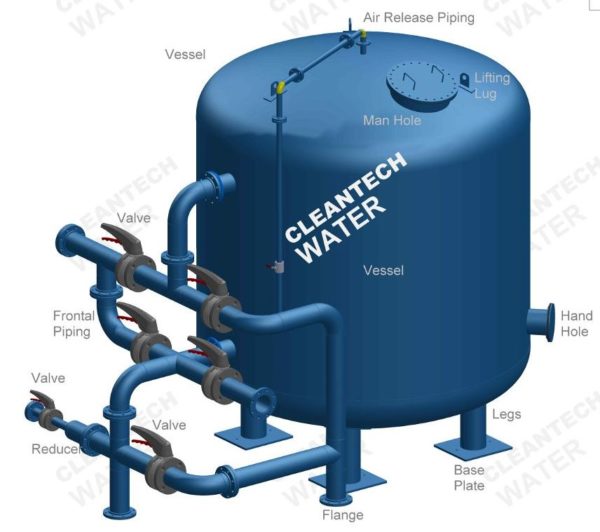Pressure sand filters have become a critical component in the process of treatment of water. As the name suggests, sand filters work by filtering out water using sand. The water that is to be purified is slowly passed through sand so that dirt particles are extracted by the fine pores of sand. This technology has witnessed wide-spread application in ground water cleaning, rinse water processes, recirculating systems, irrigation systems, etc.
Here is a detailed account of what pressure sand filters are, their functions, their mode of operation and their difference from activated carbon filters.
 What is a Pressure Sand Filter?
What is a Pressure Sand Filter?
A sand filter, as you would understand from the name itself, is a filter that is filled with sand. The sand used in the filter is a combination of sand particles that differ in size. At the bottom of this filter, a porous double bottom collector is placed. The size of the sand filter will depend on the flow rate of the liquid, which is usually water. The material used for the filter ranges from steel to concrete. Sand filters usually form the lead in the water filtration process, followed by activated charcoal filters.
How Does a Sand Filter Work?
Cleansing water of contaminants using sand filtration is one of the oldest methods of filtration. The operation of the sand filter is quite simple yet efficient. Water is gradually passed through a filter that contains sand of a certain particle size. The composition of the sand filter depends on the kind of impurities that need to be filtered out. Hence, sand filters also come in with different layers for efficient filtering.
These filtered particles accumulate in the outer layers of the filter. After the expiration time, the water will have to be pushed in with more pressure. To keep the pressure sand filter from getting clogged with filtered out impurities, the sand filter is to be back washed. This back washing is done by reversing the direction of the flow of water. Through backwashing, the filter can be cleaned of all such impurities and reused for further filtration processes.
What Are the Advantages of Using a Sand Filter?
There are several advantages that a sand filter or a pressurized sand filter offers:
- Pressurized sand filters can easily remove visible and suspended impurities such as heavy metals, silt, and sand. Furthermore, it is found to significantly reduce protozoa and bacteria.
- With effective removal of impurities, this process reduces the turbidity and TSS of the water
- Pressurized sand filtration is also useful in removing ammonia, demagnetization and deferrization of water and thus significantly improves quality of water
- Sand filters are easy to maintain and operate
The best part of sand filtration is that the removal of impurities is extremely efficient, and the cleansed water has a long lifetime
Application of Sand Filters
Sand water filtration is used across industries. For example, it is a vital process in the preparation of cooling water. It is also an integral procedure in treatment of wastewater.
Other industry applications of pressurized sand filters include production of wastewater, filtration in swimming pools, pre-filtration for membrane systems, filtration of gray or surface water and in cleaning swimming pool water.
What is the Difference Between a Pressure Sand Filter and Activated Carbon Filter?
Although similar from a construction point of view, activated carbon filters are quite different from pressure sand filters. The most important difference is that the media is under a bed of coarse aggregates, pebbles, and large layer of activated carbon.
Activated carbon filters are efficient in absorbing residual chlorine that has not been absorbed in the previous stage of filtration. It is also quite effective in adsorbing molecular organic particles or elements that have escaped filtration in the previous stage. It is also great at eliminating any odor, colour, pesticides and even several organic components that might be present in the water.
These filters are usually placed after sand filters. Activated carbon filters also need maintenance as you would do for sand filters.
Some of the factors that affect the life span and efficiency of activated carbon filters include the composition and concentration of pollutants, the duration of airflow in the filter and temperature of the water and humidity.
Want to know more about sand filtration and the best products available? Here is your opportunity to reach out to the experts at Cleantech Water!
Delivering World-Class Products and Services for a Green Earth
Cleantech Water is a company led by individuals who are committed to the cause of sustainability and environment conservation by providing water treatment solutions across the globe. From pressure sand filters to sewage treatment plants in India, Cleantech water has unique and effective products and high-quality services to offer. To know more about us, call us at +91-9099915539 / +91-7935660299 or write to us at Info@cleantechwater.co.in.

